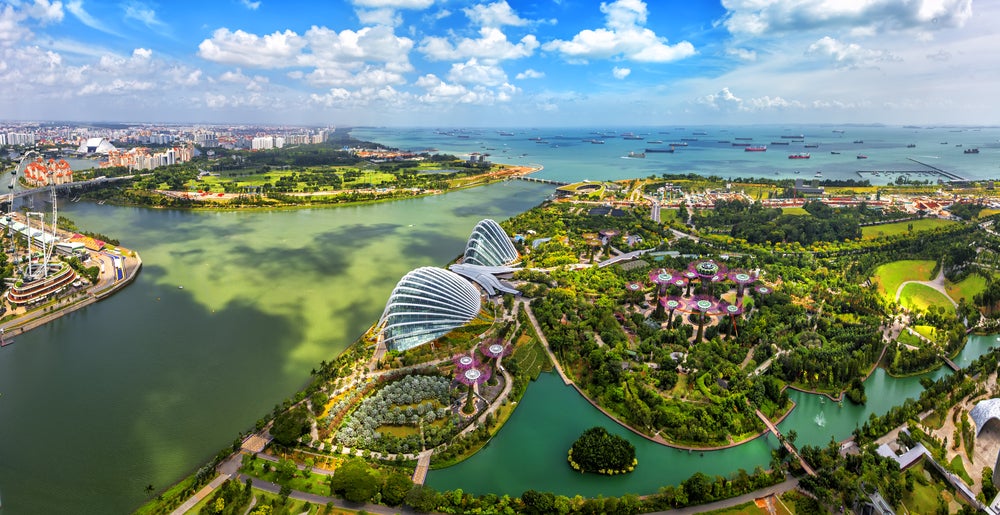Green cities beyond failure: Towards hopeful epistemologies of ecological urban futures

Existing scholarship on green cities or eco-developments is often preoccupied with finding fault in Asia’s green city practices. As ‘eco’ or ‘green’ plans for development and governance proliferate across the world, the chasm between rhetoric and reality appears widened. Research at ARI’s Asian Urbanisms Cluster seeks to enable more hopeful conversations about how green cities can move beyond failure in future practices. Below, we introduce existing discourse about ‘green’ or eco-city developments in Asia and highlight the call for hopeful epistemologies in urban scholarship.
Since the environmental movement gained momentum globally in the 1970s, eco-environmental rationality has inflected urban design and planning experimentation, including in Asia. As the rapid spread of green ideologies and politics is revolutionising urban policy landscapes, increasing urban innovations aim to revamp the modern city for a symbiotic human-nature relationship.
Many new city developments are carried out under the banner of ‘sustainable’, ‘ecological’, or ‘low-carbon’ cities. Asian cities, racing to pioneer innovative development in the twenty-first century, compete to build greener cities. Some of the world’s most ambitious green city experiments have been carried out in Asia. For example, the eco-city model, first proposed in North America according to principles of sustainability, has been reinvented in Asia as a paradigm for future urbanisation. Over the last two decades, China built the world’s largest eco-cities, notably Sino-Singapore Tianjin Eco-City. In the meantime, more Asian countries have put forward green plans to rework their cities. These ostensibly green cities are conceived as carriers of innovative ideas and as pilot projects demonstrating alternative visions for urban futures. However, the implementation of most of these experimental projects has fallen short due to entrenched socioeconomic and political issues in society.
The world in the Anthropocene must continue the battle against a deteriorating environment. Plans for green(er) cities in Asia are among the world’s most recognised ecological imaginaries of urban futures. Yet the rapid increase of green city projects has led to confusion and skepticism. On one hand, overuse of ‘green’, ‘ecological’, and ‘sustainable’ labels in urban projects obfuscates their meanings. On the other hand, the formats of green cities are imagined according to disciplinary knowledge and cultural perspectives. Their outcomes evolve over time, and their green strategies are often compelled to change direction in response to local conditions.
The dynamic processes of trial and error during implementation obscure the actual impacts of a green city project. With the combined effects of conceptual confusion and practical challenges, the discourse about what constitutes a greener urban future has become increasingly chaotic. Meanwhile, scholars argue that what has been done in the existing green cities is far from enough. While most green city projects began with physical reconfiguration—a daunting task in itself—scholars stress that genuine green transitions entail concomitant economic, social, and political reforms at broader scales transcending project-based territories. The difficulties in the conceptualisation and implementation of green cities suggest the need for both theoretical and practical breakthroughs.
There is, by now, a large and valuable body of critical urban scholarship on green and sustainable urbanisms in Asia. Many case studies have focused on the most high-profile eco-cities in China. While media often condemn these projects as mere greenwash, scholars have generated a range of critical insights into Asia’s eco-city projects. These critiques mainly fall within six categories:
- Eco-modernisation and a techno-scientific fix:
Eco-cities often overly rely on techno-scientific solutions which fail to reduce the projects’ environmental impact or create healthy urban ecologies. The scientific frameworks are rigid and deterministic in nature. And the green technologies are imported from the West without enough understanding of their applicability or financial cost. - Growth machine and green capitalism:
Succumbing to the neoliberal regimes in Asian states, eco-city projects consistently prioritise economic concerns over environmental ones. Such an approach suggests an inherent contradiction between the environment and economy in capitalist systems: capitalising on nature leads to its decay or destruction. - Self-contradictions due to land speculation and eco-labelling:
Eco-cities are developed in ways that contradict their supposed eco-environmental premises. Eco-city developments damage ecologies since they are often built in greenfield sites outside existing urban areas to exploit rural land. In some cases, they can be conventional speculative land development projects with environmental features tacked on, such as parks, energy harvesting collectors, water management systems, and waste treatment plants, to satisfy sustainability indicators and earn ‘eco’ certification. - Global ‘masterplanners’ and a universally applicable model:
Eco-cities are products of the globalisation and neoliberalisation of the design and planning industry. Prestigious global design firms speed up the production of design and planning to reduce project development costs. In turn, these global masterplanners propose similar ideas across multiple sites in different countries based on untested assumptions. This has led to an implicit consent to a universally applicable model for green cities. - Impractical appropriation of foreign approaches:
Local authorities often entrust ecological design and planning to foreign experts due to a lack of experience. With a limited understanding of local conditions, foreign experts introduce ideas that have originated in different social and political economic contexts, especially Western industrialised societies. During implementation, local societies lack the required cultural and social structures, such as Western democracy, strong civil society, and political accountability, to support the cross-cultural appropriation of ecological approaches. - Contrasting views on growth:
Growth is a concept fraught with socio-political debates in Western developed countries, but it is less challenged in Asia’s developing countries. The environmental movement spreading across Western societies has reshaped views on urban nature. Accordingly, humans rely on the environment for survival and, hence, growth must be curbed for environmental protection. In contrast, emerging markets such as China have fewer limits to development that engineer nature to facilitate growth.
The abovementioned discourses form a compelling account of how and why green cities have failed in Asia. As more urban areas across the world adopt green visions, more case studies are conducted to document how these projects have yet to deliver on their environmental promises. New research often echoes existing criticism and concludes that green cities are doomed to failure. Many critics draw on Marxist critiques about modern society and argue that economic productivity in capitalist systems fundamentally undermines social equity and environmental well-being. Such criticism is extended to the interrogation of recent trends of neoliberalism and globalisation which are understood to simultaneously influence, and intrinsically undermine, green cities. In addition, theorists in political ecology condemn existing environmentalist approaches as inherently reactive, piecemeal, and superficial, which will fail to prevent social-ecological catastrophes or subvert the rule of capitalism.
Together, the dominant discourses reinforce a recurring and deterministic view that without radical reforms existing political-economic structures will ultimately inhibit green city experiments. While such wholesale structural transformations seem far-fetched in most societies, the saturation of existing criticisms inevitably conjures up a bleak outlook on ecological urban futures. Repetition of similar criticisms is prone to overgeneralise the drawbacks of green city experiments, especially when the dominant discourse overshadows contextualised and differentiated outcomes. As a result, green cities are often viewed as ecological utopias that disguise state or market rationale while rendering capitalist ‘growth machines’ ethical. As such, dismal representations have pervaded urban scholarship, and research and theorisation on green cities seems to have hit a cul-de-sac of universal disapproval.
Calls for more hopeful epistemologies have also been made by other urban scholars working in Asia and elsewhere. As a prominent example, in his review of work on gated communities, Pow (year?) takes issue with the dystopian ‘mono-logic of urban fortification and segregation’ advocating ‘epistemologies of hope’ as a corrective to the predominance of ‘noir urban scholarship and universal pessimism’. Rather than viewing the modern city as dystopias ridden with flaws of neoliberalism, Pow encourages “intellectual commitment” to understand the more subtly diverse logics and rationales of urban change. Other scholars also call for hopeful research on urban practices that moves beyond the ‘universal alarmism’ against neoliberal forces.
In a similar vein, we seek to expand ‘epistemologies of hope’ by providing constructive advice for future research while inspiring alternative imaginaries of ecological futures. We view Asia as a laboratory of invention and reinvention rather than simply practical failures. Asian cities are key sites of knowledge production and inspirations for urban futures. They not only import, but also rework and increasingly even export, ecological imaginaries of urban futures. We hope to nurture productive conversations among scholars, researchers, and practitioners from different parts of urban Asia and/or working on the region who might not previously have engaged with each other. In this way, our research facilitates interregional and cross-cultural comparisons across ‘urban Asias’.
At ARI Asian Urbanisms Cluster, we acknowledge the importance of scholarly critiques of green cities but also seek to nudge the discourse beyond conclusions of inevitable failure. Colleen Chiu-Shee, Postdoctoral Fellow at ARI, and Tim Bunnell, ARI Director and Professor in NUS Department of Geography, have planned a workshop that takes critical academic insights into green, sustainable, and ecological urbanisms in Asia as a starting point for collective reflections on ecological urban futures. The goal is neither to reify the pessimistic epistemologies of green cities nor to rebut dominant critiques. Rather, we leverage existing critical insights in search of promising roadmaps towards alternative urban ecological futures. We call for more studies on green cities with a hopeful, future-oriented outlook.
The views expressed in this forum are those of the individual authors and do not represent the views of the Asia Research Institute, National University of Singapore, or the institutions to which the authors are attached.








